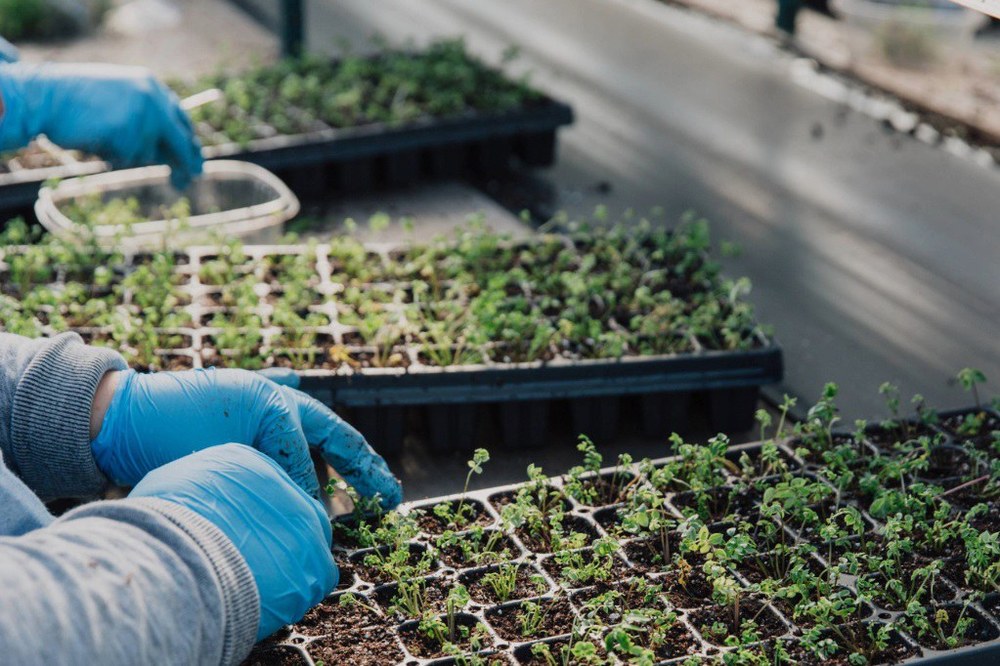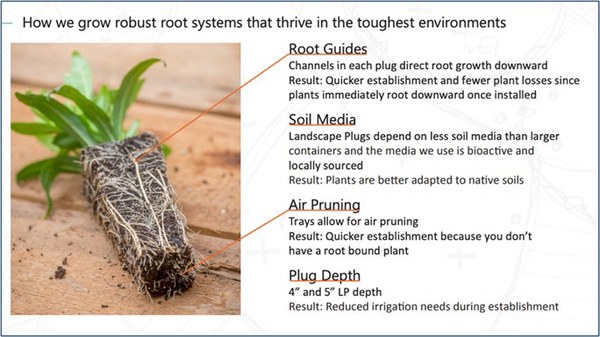Posted: April 17, 2025
The Penn State Master Gardeners of Westmoreland County plant sale is May 10, 2025, from 8 AM to Noon. Master Gardeners will once again offer for sale a large variety of tried-and-true native plants.

Landscape Plugs(TM). Courtesy of North Creek Nurseries
This year, however, the plants will be in the form of Landscape PlugsTM rather than 4- to 8-inch pots. You may be wondering what a Landscape PlugTM is.

The Landscape PlugTM (LP) was developed by North Creek Nurseries in Landenberg, PA. It is a seedling grown in a unique plant tray that has deeper and wider cell dimensions. The plug chambers are designed to accommodate the different ways that roots grow (called root morphologies), which encourages optimal root development. It is said that when you purchase an LP, you are buying roots, not plants. Don't be fooled when you see only a few inches of leafy plant material above the soil level.
With LPs, deeply rooting plants, such as forbs and grass species that have deep taproots or deeply fibrous roots, are given more space in which to develop healthy roots. Examples of these plants are wild bergamot, little bluestem, and milkweeds. Laterally rooted plants, which generally are more fibrous and shallowly rooted, have more room to develop than in a typical plant tray. Examples of these plants are Virginia bluebells, wild geranium, and Pennsylvania sedge.
These plant tray cells prevent root circling and encourage thick, healthy roots that will be quicker to establish when planted in the ground. LPs are usually more economical, and they have a smaller carbon footprint because they weigh less than plants in containers, requiring less freight, materials, and handling. The plug trays we receive from our wholesale supplier, North Creek Nurseries, are made from 100% recyclable material. This is a good example of smaller is better.
Luckily for us, LPs are quick and easy to plant. Remove the plug by pushing it up through the hole at the bottom of the cell. Prepare a hole in the ground with a hand trowel, weeding knife, or auger, then place the plug in the hole and gently tamp around it. The small size of the plants overall makes them easy to handle.
General Guidelines for Planting LPs
- Keep your plugs in their cells and in a shady location until you plant them, and check the moisture level often.
- Harden off the LP if the seller recommends it.
[Some LPs purchased at the Master Gardener plant sale do not need to be hardened off because they have been "vernalized" (gone through a period of cold conditioning), but other LP species will need hardening off. Plant signs will indicate how to care for each type of native plant.]
- Plant LPs while they are in active growth only.
- Water the LPs before removing them from their tray or cell.
- Avoid planting on a site with soil that is too wet.
- Remove plants from plugs by pushing them up from the bottom; do not pull on the plants' foliage or stems.
- Do not tease the root system apart or shake the soil off the roots.
- It is recommended to apply 2 to 4 inches of mulch prior to planting for ease of application, but keep mulch away from your plants' foliage and stems after planting.
- Ensure the soil level of the hole evenly matches the top of the soil level of the LP.
- Place the plug in the hole and gently tamp down the soil around the plant to increase soil-to-root contact.
- Avoid causing unnecessary soil compaction around the plants.
- Water immediately to reduce air pockets and to ensure contact between the roots and the
- Irrigate as needed, but as infrequently as possible; once established, the LPs will use available Over time, irrigation should become less necessary.
- Sites with stable soils and appropriately chosen species should not require additional fertilizers or amendments.
- Keep the planting bed free from undesirable species.
- Monitor the planting regularly for signs of stress and weed pressure.
Slopes or areas subject to erosion should be covered with a biodegradable soil blanket prior to planting. Make planting holes through the blanket and into the ground. In time, the native plants will provide soil stability, and the blanket will decompose.
For shoppers, LPs may not be as colorful and showy as potted plants that have been coaxed in the greenhouse to develop quickly and bloom early. This is why nurseries don't often sell LPs in their retail markets. We are anxious to receive feedback from our shoppers about our LPs after they have been planted in their home landscapes. Our hope is that they will perform exceptionally well and provide many years of enjoyment and beauty in the garden.
Stop by our Native Plug Station on Saturday, May 10, from 8 AM to Noon to see LPs and discuss your garden needs with Penn State Master Gardeners.
Thank you to North Creek Nurseries for their help in providing the above guidance.
Written by Deb Christopher, Penn State Master Gardener of Westmoreland County

